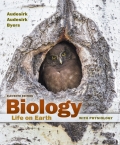
Concept explainers
Whale skeletons contain nonfunctional pelvic bones
a. as a result of convergent evolution.
b. due to catastrophism.
c. because whales evolved from ancestors that had hind legs.
d. because the bones might be needed for a future adaptation.
Introduction:
The vestigial can be referred to a rudimentary structure present in the body of an organism, which does not have any prominent function. These structures were functional in the ancestors of the organism, but during the course of evolution, the organism loses its function.
Answer to Problem 1MC
Correct answer:
The pelvic bone in the whales is a vestigial organ, which had a function in their ancestors, having hind limbs.
Explanation of Solution
Explanation for the correct answer:
Option (c) is given that the nonfunctional pelvic bones are present in whale’s skeleton as whales evolved from the ancestors that had hind legs. The whales are known to evolve from the Pakicetus. These organisms had four legs, and the hind limbs were functional. During the evolution, the hind limbs were lost, but the pelvic bone is still present in the whales. Hence, option (c) is correct.
Explanation for the incorrect answers:
Option (a) is given that the nonfunctional pelvic bones are present in whale’s skeleton as a result of convergent evolution. The convergent evolution can be defined as the process, in which the closely related species independently evolve the similar structures or traits to adapt to the environment. However, the pelvic bones were present in the ancestor of the whales, this is not evolved. So, it is an incorrect option.
Option (b) is that the nonfunctional pelvic bones are present in whale’s skeleton due to catastrophism. The catastrophism referred to a change, which occurs suddenly in the organism. However, the pelvic bones are not suddenly developed in the whales, it is not an example of catastrophism. So, it is an incorrect option.
Option (d) is because that the nonfunctional pelvic bones are present in whale’s skeleton might be needed for a future adaptation. The bones of the pelvis were functional in the ancestors of the whales. This is not evolved for the future adaptation. So, it is an incorrect option.
Hence, options, (a), (b), and (d) are incorrect.
Thus, it can be concluded that pelvic bones are a vestigial organ in whales. These were functional in their ancestors, but in whales, they are nonfunctional.
Want to see more full solutions like this?
Chapter 15 Solutions
EBK BIOLOGY
- Not part of a graded assignment, from a past midtermarrow_forwardNoggin mutation: The mouse, one of the phenotypic consequences of Noggin mutationis mispatterning of the spinal cord, in the posterior region of the mouse embryo, suchthat in the hindlimb region the more ventral fates are lost, and the dorsal Pax3 domain isexpanded. (this experiment is not in the lectures).a. Hypothesis for why: What would be your hypothesis for why the ventral fatesare lost and dorsal fates expanded? Include in your answer the words notochord,BMP, SHH and either (or both of) surface ectoderm or lateral plate mesodermarrow_forwardNot part of a graded assignment, from a past midtermarrow_forward
- Explain in a flowcharts organazing the words down below: genetics Chromosomes Inheritance DNA & Genes Mutations Proteinsarrow_forwardplease helparrow_forwardWhat does the heavy dark line along collecting duct tell us about water reabsorption in this individual at this time? What does the heavy dark line along collecting duct tell us about ADH secretion in this individual at this time?arrow_forward
 Concepts of BiologyBiologyISBN:9781938168116Author:Samantha Fowler, Rebecca Roush, James WisePublisher:OpenStax College
Concepts of BiologyBiologyISBN:9781938168116Author:Samantha Fowler, Rebecca Roush, James WisePublisher:OpenStax College Biology: The Dynamic Science (MindTap Course List)BiologyISBN:9781305389892Author:Peter J. Russell, Paul E. Hertz, Beverly McMillanPublisher:Cengage Learning
Biology: The Dynamic Science (MindTap Course List)BiologyISBN:9781305389892Author:Peter J. Russell, Paul E. Hertz, Beverly McMillanPublisher:Cengage Learning
 Comprehensive Medical Assisting: Administrative a...NursingISBN:9781305964792Author:Wilburta Q. Lindh, Carol D. Tamparo, Barbara M. Dahl, Julie Morris, Cindy CorreaPublisher:Cengage Learning
Comprehensive Medical Assisting: Administrative a...NursingISBN:9781305964792Author:Wilburta Q. Lindh, Carol D. Tamparo, Barbara M. Dahl, Julie Morris, Cindy CorreaPublisher:Cengage Learning Biology (MindTap Course List)BiologyISBN:9781337392938Author:Eldra Solomon, Charles Martin, Diana W. Martin, Linda R. BergPublisher:Cengage Learning
Biology (MindTap Course List)BiologyISBN:9781337392938Author:Eldra Solomon, Charles Martin, Diana W. Martin, Linda R. BergPublisher:Cengage Learning Human Biology (MindTap Course List)BiologyISBN:9781305112100Author:Cecie Starr, Beverly McMillanPublisher:Cengage Learning
Human Biology (MindTap Course List)BiologyISBN:9781305112100Author:Cecie Starr, Beverly McMillanPublisher:Cengage Learning





